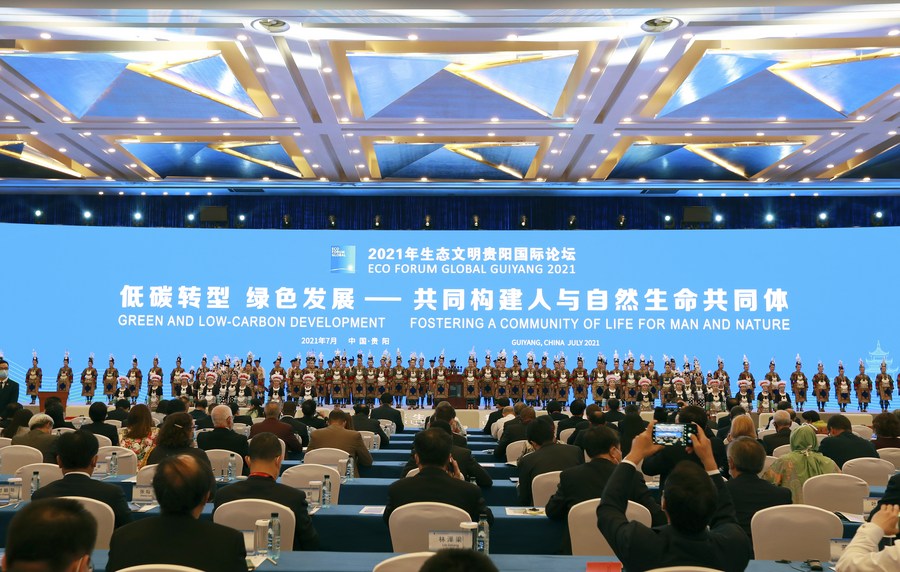Green finance high on China's agenda to achieve carbon neutrality

Dancers perform at the opening ceremony of Eco Forum Global Guiyang 2021 in Guiyang, capital of southwest China's Guizhou Province, on July 12, 2021. (Xinhua/Liu Xu)
The Jianjiang River, the local "mother river" that runs through Tianzhu County of the Qiandongnan Miao and Dong Autonomous Prefecture in southwest China's Guizhou Province, was once a bother for locals as river blockages often caused heavy flooding and its pungent water was full of litter all year round.
Environmental cleanup efforts had fallen short over the years as the county government, which has an annual fiscal revenue of less than 1 billion yuan (about 155 million U.S. dollars), could not afford high spending on the river's ecological restoration.
In 2018, the Guiyang branch of the Industrial Bank brought succor to the poverty-ridden county and provided a loan of approximately 1.17 billion yuan to support the Jianjiang River cleanup project. The riverbed was widened, embankments were reinforced, and a sewage treatment plant along the river was expanded.
The river will be transformed into a waterscape scenic area featuring local customs and culture, as well as activities for locals and tourists including camping and rafting. It is expected to receive more than 400,000 tourists annually after construction is completed.
Over an 11-year period, the scenic area is expected to bring more than 10,000 job opportunities, create over 4 billion yuan in revenue, and benefit approximately 110,000 surrounding residents.
The timely loan is just one example of China's booming green finance services.
The Industrial Bank has been looking to green finance for a decade and a half, and was the first in China to adopt the Equator Principles, which advocate that financial institutions determine, assess and manage environmental and social risks in project finance.
The bank currently has a financing balance of approximately 1.3 trillion yuan in the sector and has served 33,000 corporate customers, according to Tao Yiping, the bank's president.
"China needs an investment of 100 trillion yuan to go carbon neutral. The need for capital is high, and the space for green financing is also large," said Tao during Eco Forum Global Guiyang 2021, held on Monday in Guiyang, capital city of Guizhou Province.
China's ambitious goals of peaking carbon dioxide emissions by 2030 and achieving carbon neutrality by 2060 mean a historical opportunity for the country's financial industry, he added.
While continuing to serve pollution prevention and control, green finance can further support the reduction of carbon emissions in sectors including clean energy, renewable energy, eco-friendly transportation and construction, industrial energy conservation, innovation in green and low-carbon technologies, said Tao. "In turn, those fields may well become new growth motors for banking businesses."
Green finance became a buzzword during the two-day global forum on ecological civilization in Guizhou, as many attendees agreed it is conducive to further reducing the green premium and achieving an eco-friendly and low-carbon economy.
"As China's green transition takes off, its social, industrial and energy structures will all face an in-depth low-carbon transformation, where financing institutions can help and must take on their responsibilities," said Xu Shouben, vice president of the Industrial and Commercial Bank of China (ICBC).
By the end of June this year, ICBC's green loan balance exceeded 2 trillion yuan, ranking first among domestic financial institutions.
As one of the country's first green finance reform and innovation pilot zones and the only such zone located in southwest China, the Gui'an New Area in Guizhou has rolled out supporting policies and more than 60 green financial products and services, established 14 green finance business divisions or specialized agencies, and introduced and cultivated 64 professional green finance institutions.
Quzhou City in east China's Zhejiang Province is also a pilot zone for green financial reform and innovation. It has opened "carbon accounts" for local enterprises, classifying the enterprises according to their carbon emission intensity. By encouraging or discouraging related enterprises through financial means, the system helps promote the green and low-carbon transitions of the enterprises.
In February, China put into effect a set of interim rules for carbon emissions trading management, marking a key step in the establishment of a unified national emissions trading system.
A total of 2,225 power firms across the country, each assigned a carbon dioxide emission cap, can trade their emission quotas via the system, with firms that exceed their caps being able to purchase unused quotas from those with low emissions.
Lan Hong, deputy director of the ecological finance research center at the Renmin University of China, said that green finance can help drive the growth of China's economy while serving the country's endeavor to reach carbon neutrality.
"The essence of green finance is translating environmental protection and ecological tasks into a country's development potential," said Lan. ■